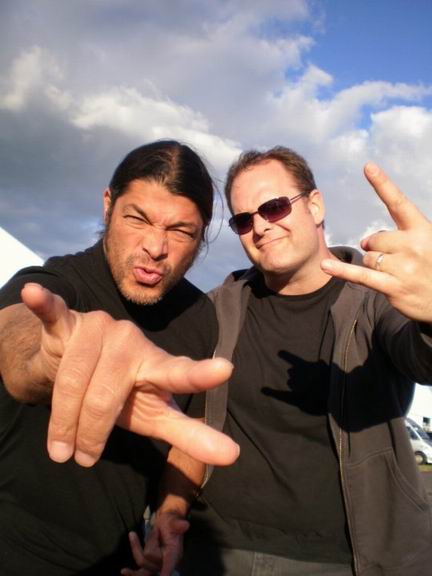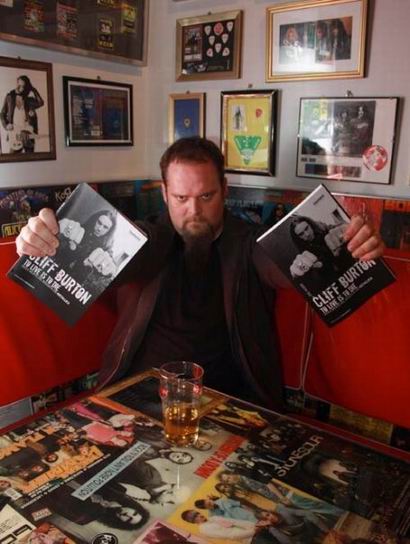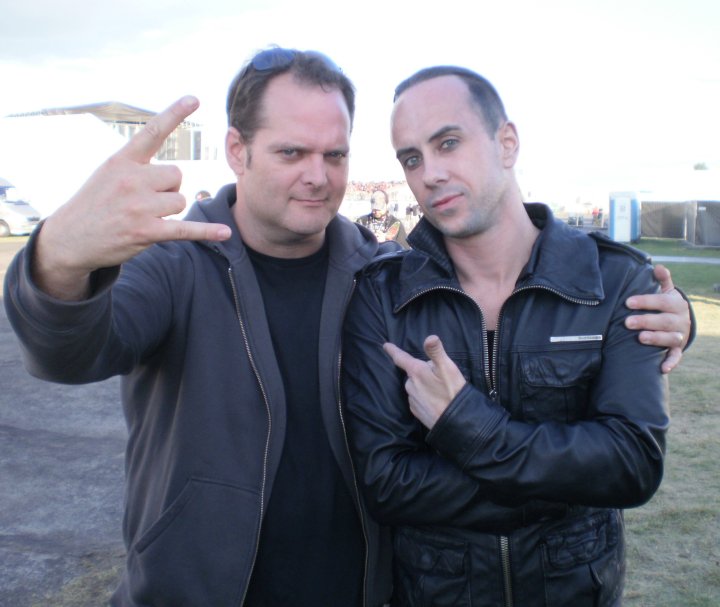Overkill.pl - Joel McIver interview
 Overkill.pl: First of all, thank you very much for your time, and my congratulations. Don't know if you heard this but Martin Popoff described you as a “probably the top music scribe in the world right now”. Hell of an opinion, did you imagine such words few years ago?
Overkill.pl: First of all, thank you very much for your time, and my congratulations. Don't know if you heard this but Martin Popoff described you as a “probably the top music scribe in the world right now”. Hell of an opinion, did you imagine such words few years ago?
Joel:
I did hear that and it's an amazing compliment! Martin himself is a very respected writer. I think he called me that because at that particular time my books were getting a lot of attention. It's true that I'm operating close to the top of my profession, but there are other music writers whose books are equally well known such as Mick Wall and Stephen Davis, who have been writing a lot longer than I have.
Overkill.pl: I wanted to start with a question about legendary Cliff Burton, whom you dedicated one of recently published books. In a few words, what is the reason of his phenomenon. Is it unique style of playing the bass or maybe humbleness, independence, charisma etc?
Joel:
All those things. Cliff was the kind of guy who you would want to have as your friend. He was loyal, kind, funny, intelligent, caring and so on, although he was of course a human being with all the normal flaws which that implies. As a bass player, he was unprecedented. His combination of classical scales with effects was a unique voice, although the recordings he made while he was alive are, I think, a faint shadow of the music he would have made nowadays if he'd survived.
Overkill.pl: There is no doubt: when a rockstar dies too young, it helps the legend rise. There is a big part of it in a history of Cliff Burton. I often read the opinions that he's the best bassist ever walked the earth, which is in my humble opinion a bit exaggerated. Robert Trujillo never got half that respect from fans, even though he's incredible musician and great personality. Don't you think that's bit to much?
Joel:
You're right about the effect of posthumous glory. It's not fair to say that Cliff was the greatest bass player who ever lived, although he might have become that player had he lived. As I see it -- and I've been playing and writing about the bass guitar for many years -- the most accomplished and influential bassist who ever lived would be one of Jaco Pastorius, Jack Bruce, James Jamerson, Jeff Berlin or John Entwistle (why they all begin with J is a mystery to me). In metal, the best players are Cliff, Steve Harris, Steve DiGiorgio and Alex Webster, without a doubt.
Overkill.pl: You said you aren't sure what would Metallica do in 90's if Burton was still alive. That's a very popular opinion, still not very consequent. I read about him, I listen to his parts, and see really interesting, a little fragile guy in a Lynyrd Skynyrd t-shirt. Do you really think Cliff, who studied classical music, listened to country/rock bands and got Misfits tattoo would be disappointed by band, experimenting with other genres, other ideas, recording rock album? Or is it just the vibe around the band, that would be wrong?
Joel:
The reason I said that I didn't know the answer in the book is the same reason that I still say it now -- it's impossible to speculate. He did say that he could imagine Metallica playing softer music in the future. You have to remember that he was very young when he died, and his opinions on music and life could have changed radically as he matured, so no-one knows what he would have thought at the age of 48 (which he'd be now, if he'd survived).

Overkill.pl: Honestly, basing on your thoughts I used to consider you as a not very open minded (musicaly) person. Then I've studied your bibliography, and noticed few non-metal artists, there are rock bands like Qeens of the Stone Age, RHCP, plus even Erykah Badu or Ice Cube. I'm quite sure you listen to different kinds of music. So, could you tell me, why there is a major problem with accepting different ways by Metallica. Is it the music you consider bad, is it ideological point (Metallica playing rock music on Load album), or do you think they did it for the fame and money. Share your thoughts.
Joel:
I think Metallica have always done what they thought was best: they didn't do anything for fame or money. But I think the music they've made between 1996 and now is mostly below average.
Overkill.pl:
So, if you'd supposedly listen to Load/Reload album recorded by some unknown, begining rock band you'd say the same thing, that the songs are mostly below average?
Joel: Yes.
 Overkill.pl: I didn't have an occasion to read details of your Top 100 Metal Guitarists ranking. But it made pretty much ruckus on the internet. Let's face it: it's ALWAYS controversial, because everyone can do his own ranking. Joel, what is most important for you as a fan, as a creator of this ranking. Technical skills , being creative composer, feeling.. or a bit of everything? It was always ridiculous to me to even compare guys like Petrucci to Jimmy Page for example. Different WORLDS. Feel free to discuss. Overkill.pl: I didn't have an occasion to read details of your Top 100 Metal Guitarists ranking. But it made pretty much ruckus on the internet. Let's face it: it's ALWAYS controversial, because everyone can do his own ranking. Joel, what is most important for you as a fan, as a creator of this ranking. Technical skills , being creative composer, feeling.. or a bit of everything? It was always ridiculous to me to even compare guys like Petrucci to Jimmy Page for example. Different WORLDS. Feel free to discuss.
Joel:
I explained very clearly in the book that my criteria were 1) technical ability and 2) influence. So Tony Iommi, who is the father of heavy metal guitar but doesn't play in a very technical style, is at the high end but not number one. I agree that most of the guitarists come from very different musical styles.
Overkill.pl: I will always give a hi-five to a guy who put James Hetfield higher than Kirk Hammett. Don't you think that it's really common not to note how good Hetfield really is, just because he rarely plays solos (btw. What a pitty, because I'm sure they would be great), not to observe how solid are James' parts etc?
Joel:
People often fail to understand how influential James's rhythm playing was. His palm muting and machine-like downstrokes not only gave Metallica their own sound, they influenced a generation of guitarists to play with precision and accuracy.
Overkill.pl: After the publication Dave Mustaine was really excited about winning it all, but especially about being matched higher than James and Kirk. Another thing to fuel war between Megadeth and Metallica fans. How do you see the whole problem? Is it me , or Dave Mustaine was always touchy about Metallica's success?
Joel:
It's well known that Mustaine found Metallica's success difficult to deal with, but I think all that stuff is mostly finished now. The Big Four shows drew a line underneath two decades of bullshit.
Overkill.pl: After all, they reunited during Big Four Tour, do you think, that this is really the end of feud between legendary trio Megadeth, Slayer and Metallica? Can Dave, Kerry and Lars stop? Or is it just the question of time for the press to spoil the peace?
Joel:
Who knows. I hope it's all finished, it's not healthy for anyone to continue these feuds.
Overkill.pl: What many dreamed about came true - Metallica finally made a big come back to their musical roots, was it good - a question of taste, but did they really need help from Rick Rubin to make this happen? Sometimes it's a bit ridiculous to me, that they needed somebody to sit and say “hey guys, you're a legend, just do it, try to feel like in master of puppet days”. 45 years old rock/metal legends couldn't do it by themselves?
Joel:
I agree. I'm surprised they didn't self-produce the album.
Overkill.pl: What do you expect of next album? Early to judge, but they say it's just the begining of the new-old way. Do you believe that 50-years old Het and Ulrich can record the classic?
Joel:
I think they *can* record a classic, but I don't think they *will*. But it doesn't really matter. What really counts is Metallica's live show, which is still absolutely world-class. It's the same with a lot of classic bands: their recorded music isn't half as important as their back catalogue and their live gigs.

Overkill.pl: No discussion, you got your position among heavy metal fans, and musicians as a decent biographer, you met your idols, you work with them, what next, Joel, do you feel you achieved what you planned, or is it just the beginning?
Joel:
Both. I had a five-year plan between 2005 and 2010 and achieved everything I wanted to in that time. In the next five years I want to do more co-written autobiographies such as the one I've just done with Glenn Hughes. There are three possible books on the way along those lines, which I'll explain more about when the contracts are firmed up.
Overkill.pl: Again, thank you very much for your time.
Ugluk
|
|











